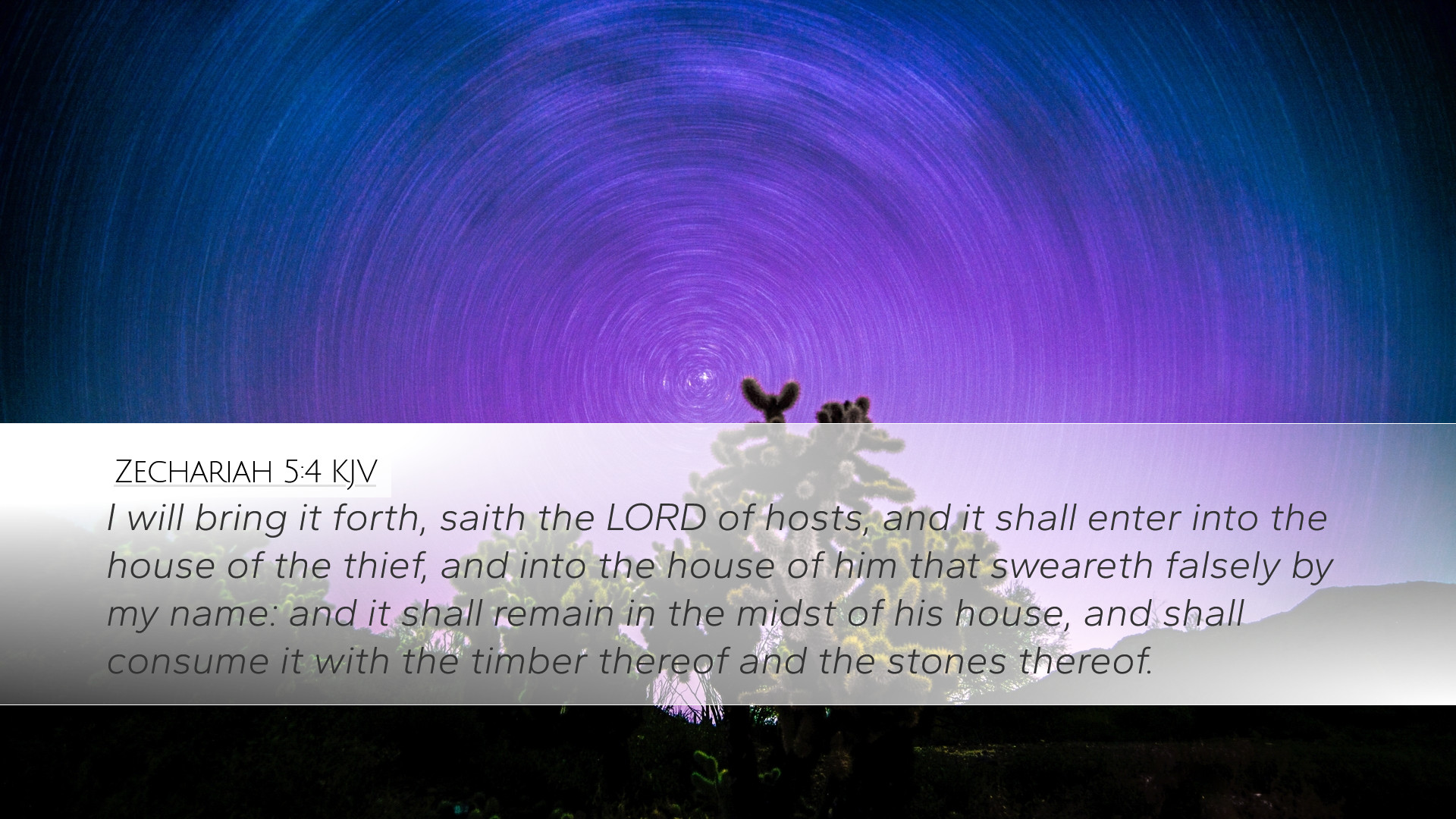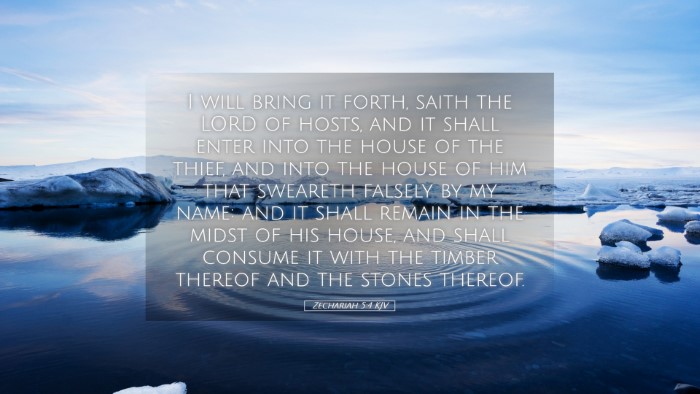Old Testament
Genesis Exodus Leviticus Numbers Deuteronomy Joshua Judges Ruth 1 Samuel 2 Samuel 1 Kings 2 Kings 1 Chronicles 2 Chronicles Ezra Nehemiah Esther Job Psalms Proverbs Ecclesiastes Song of Solomon Isaiah Jeremiah Lamentations Ezekiel Daniel Hosea Joel Amos Obadiah Jonah Micah Nahum Habakkuk Zephaniah Haggai Zechariah MalachiZechariah 5:4
Zechariah 5:4 KJV
I will bring it forth, saith the LORD of hosts, and it shall enter into the house of the thief, and into the house of him that sweareth falsely by my name: and it shall remain in the midst of his house, and shall consume it with the timber thereof and the stones thereof.
Zechariah 5:4 Bible Commentary
Commentary on Zechariah 5:4
Zechariah 5:4 states:
"I will send out the curse, says the Lord of hosts; and it shall enter the house of the thief and the house of him who swears falsely by My name. It shall remain in the midst of his house and consume it, with its timber and stones."
Context and Background
The book of Zechariah, written during the post-exilic period, speaks to the restoration of Israel after their Babylonian captivity. Zechariah, a prophet and priest, conveys messages of hope, divine judgment, and restoration. The fifth chapter introduces a vision that underscores God's intention to purify His people and cleanse them from sin.
Interpretation of the Verse
This verse is part of a series of visions that depict the moral and spiritual realities of the time. The “curse” mentioned here symbolizes God's judgment against sin, specifically targeting deceit and dishonesty.
Commentary Insights
- Matthew Henry:
Henry emphasizes that God's curse is a divine judgment that searches and judges sin. He observes that the location of the curse—both the house of the thief and the one who swears falsely—suggests the pervasive nature of sin. In essence, sin has consequences that are inescapable, and God's authority extends to every corner of human life. Henry notes that the imagery of consuming timber and stones illustrates the totality of God's judgment on sin.
- Albert Barnes:
Barnes underscores the importance of the moral law as the basis for God's judgment. He highlights that both theft and false swearing are violations of the commandments. The mention of "the house" signifies the intimate connection between a person's actions and their living environment, indicating that sin not only affects the sinner but also their household. Barnes sees this as a call for introspection and repentance, reminding the faithful to be vigilant against immorality.
- Adam Clarke:
Clarke provides a thorough linguistic and contextual examination of the terms used in this verse. He suggests that the “curse” may refer more broadly to divine judgment that leads to spiritual and physical devastation. Clarke emphasizes the seriousness of swearing falsely, as it denotes a fundamental betrayal of trust in the community and before God. He argues that the permanence of the curse within the house reflects the intrinsic link between sin and its consequences, leading to decay not just in material wealth but also in moral standing.
Theological Considerations
This passage invites deeper theological reflection on the nature of sin, judgment, and the character of God.
- The Nature of God’s Judgment:
God's judgment is comprehensive, affecting both the physical and spiritual realms. His authority is wielded righteously against transgressions. Rather than a mere punitive action, it serves as a demonstration of divine justice intended to restore rather than to merely destroy. This aspect of God's character underscores His commitment to holiness and righteousness.
- The Link between Sin and Community:
The passage illustrates that individual sins, such as theft and perjury, have communal repercussions. As members of a community, individuals are responsible for maintaining the moral fabric, and failure to do so invites collective judgment. The challenge presented is for believers to uphold truth and integrity, recognizing their influence on the spiritual health of the broader community.
- Hope and Restoration:
While the passage denotes judgment, it also alludes to the hope of restoration. God’s desire is to lead His people away from sin and towards righteousness. The acknowledgment of sin followed by repentance can open pathways for divine grace, thus shaping a community that honors God in their dealings with one another.
Application for Today’s Believers
This compelling passage holds relevance for contemporary believers in multiple ways:
- Personal Integrity:
Believers are urged to examine their lives for any form of deceit or dishonesty. Zechariah’s warning serves as an exhortation to live with integrity, being conscious of how personal actions affect not only oneself but the community as a whole.
- Communal Responsibility:
The church, as a representation of God’s kingdom, must actively cultivate a culture of truth and transparency, thereby resisting temptation to engage in dishonest behaviors. This passage calls for church leaders to foster an environment that holds members accountable, promoting both individual and communal righteousness.
- Embracing God’s Justice:
Understanding the nature of God’s justice should bring comfort to believers, assuring them that God sees all injustices and will address them in due time. This assurance empowers believers to trust in God's timing while also encouraging them to advocate for justice in their communities.
Conclusion
Zechariah 5:4 serves as a poignant reminder of the seriousness with which God views sin. It invites profound reflection on personal conduct and communal integrity while offering a vision of hope and restoration through divine justice. As pastors, students, theologians, and scholars engage with this text, they are encouraged to seek understanding not only of God’s judgment but of His overarching desire for restoration and righteousness among His people.


